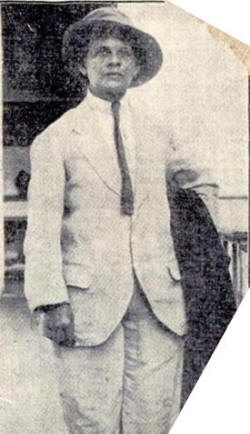 Luisa
Capetillo (October 28, 1879 – October 10, 1922) was one of Puerto Rico's most
famous labor leaders. She was a social labor organizer and a writer who fought
for equal rights for women's rights, free love and human emancipation.[1]
Luisa
Capetillo (October 28, 1879 – October 10, 1922) was one of Puerto Rico's most
famous labor leaders. She was a social labor organizer and a writer who fought
for equal rights for women's rights, free love and human emancipation.[1]
Queer Places:
Calle Capetillo, San Juan, Puerto Rico
Parque Capetillo, Calle Padre Colón, San Juan, 00923, Puerto Rico
Cementerio Municipal de Arecibo
Arecibo, Arecibo Municipality, Puerto Rico, USA
 Luisa
Capetillo (October 28, 1879 – October 10, 1922) was one of Puerto Rico's most
famous labor leaders. She was a social labor organizer and a writer who fought
for equal rights for women's rights, free love and human emancipation.[1]
Luisa
Capetillo (October 28, 1879 – October 10, 1922) was one of Puerto Rico's most
famous labor leaders. She was a social labor organizer and a writer who fought
for equal rights for women's rights, free love and human emancipation.[1]
Capetillo was born in Arecibo, Puerto Rico, to a Spanish father Luis Capetillo Echevarría from the Basque country and Luisa Margarita Perone, a Corsican immigrant. Luis Capetillo arrived in Puerto Rico at around the same time as Margarita, travelling with his family.[2]
In Arecibo, she was raised and home schooled by her parents, who were both very liberal in regard to their philosophical and political ideologies.
In 1898, Capetillo had the first of her two children out of wedlock. She found a job as a reader in a cigar making factory in Arecibo. After the Spanish–American War, the American Tobacco Company, which had gained control of most of the island's tobacco fields, would hire people to read novels and current events to the workers. It was in the tobacco factory that Capetillo had her first contact with labor unions. In 1904, Capetillo began to write essays, titled "Mi Opinión" (My Opinion), about her ideas, which were published in radical and union newspapers.[3][4]
During a farm workers' strike in 1905, Capetillo wrote propaganda and organized the workers in the strike. In 1910 she became a reporter for the "FLT" (American Federation of Labor) and traveled throughout Puerto Rico educating and organizing women. Her hometown, Arecibo, became the most unionized area of the country. Additionally, she also started her own newspaper called La mujer, which confronted women's issues.[13]
Capetillo was a reader in a cigar shop, which at the time readers were mainly men. With Capetillo holding a mans role, this is where we can conclude her feminist ideas were rooted.[14] In 1908, during the "FLT" convention, Capetillo asked the union to approve a policy for women's suffrage. She insisted that all women should have the same right to vote as men. Capetillo is considered to be one of Puerto Rico's first suffragists.[15]
In 1912, Capetillo traveled to New York City, where she organized Cuban and Puerto Rican tobacco workers. Later on, she went to Tampa, Florida, where she also organized the workers. In Florida, she published the second edition of "Mi Opinión". She also traveled to Cuba and the Dominican Republic, where she joined the striking workers in their cause.
In 1919, she challenged the mainstream society by becoming the first woman in Puerto Rico to wear pants in public. Capetillo was sent to jail for what was then considered to be a "crime", but the judge later dropped the charges against her. In that same year, along with other labor activists, she helped pass a minimum-wage law in the Puerto Rican Legislature.[16]
Capetillo died on October 10, 1922, in Puerto Rico from tuberculosis. She is buried in the Municipal Cemetery of Arecibo.[17]
In 1990, a made for T.V. movie titled "Luisa Capetillo, pasión de justicia" (Luisa Capetillo, passion of justice) was made. It was directed by Sonia Fritz and the musical arrangements were made by Zoraida Santiago.[18] In Arecibo there is a Casa Protegida Luisa Capetillo, which is a non-profit organization whose purpose is to defend women who have been mistreated physically or mentally. The University of Puerto Rico, Cayey Campus established the Luisa Capetillo Center of Documentation Hall in March 1990. The center is part of the Women Studies project started in 1986 by the university and has received financial help from the Ángel Ramos Foundation.
In May 29, 2014, The Legislative Assembly of Puerto Rico honored 12 illustrious women with plaques in the "La Plaza en Honor a la Mujer Puertorriqueña" (Plaza in Honor of Puerto Rican Women) in San Juan. According to the plaques the 12 women, who by virtue of their merits and legacies, stand out in the history of Puerto Rico. Capetillo was among those who were honored.[19]
My published books: